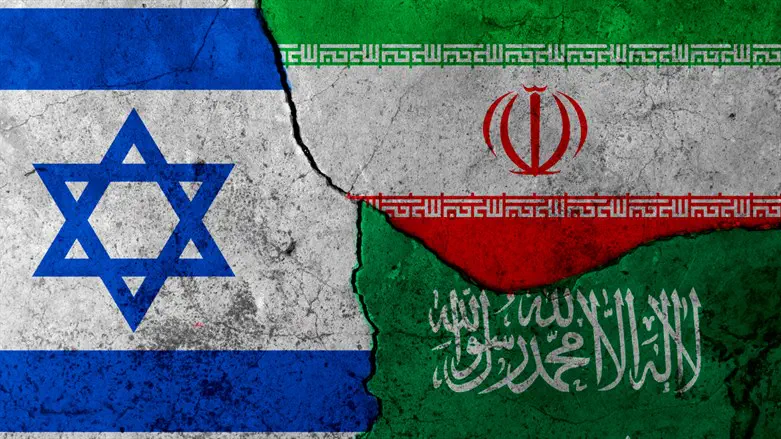
Having watched the Israel-Arab peace agreements in our region over the past decades, I often find myself wondering why Saudis and Israelis are still in a de facto state of war. The common wisdom has historically been that solving the Israeli-Palestinian Arab conflict was a prerequisite for regional peace.
During Biden's visit, the Saudis repeated that mantra in demanding the two-state solution be implemented before normalizing relations with Israel. I would respectfully suggest that our two countries look over the horizon using wisdom that may appear uncommon, but which I believe stands to better serve us both.
Although I do see a potentially bright future with my Palestinian Arab neighbors once they truly reject terror and cease their demonization of Jews, I do not think it wise to condition regional peace agreements on their choices. Most Saudis know that the Palestinian Arabs have never been friends of the Kingdom or her citizens.
-When Saddam Hussein invaded Kuwait, with his appetite set on the Saudi peninsula as a second course, frenzied Palestinian crowds cheered his bombing of Riyadh and lionized him as their champion against the pro-American Saudis.
-While a nuclear-minded Iran foments regional and global terror, seeks to destabilize the Saudi Kingdom via its proxy war in Yemen, and insults, threatens, and attacks the Saudi people at every opportunity, the Palestinian Arabs still side with the Ayatollahs. Both Hamas and the PLO share fealty to Iran and are strongly supported by a local Palestinian Arab populace which demonstrates little care for the welfare of the Arab states that support them.

To my Saudi neighbors I say: Shall we at long last agree to see and work with the best in each other to evolve a new path forward as partners? Given these realities, why do the Saudi people continue to subordinate their core national interest to Palestinian Arabs who not only have no gratitude for their brothers’ beneficence, but would also surely cheer yet again if the Iranians were to conquer the Arabian Peninsula?
Given these realities, why do the Saudi people continue to subordinate their core national interest to Palestinian Arabs who not only have no gratitude for their brothers’ beneficence, but would also surely cheer yet again if the Iranians were to conquer the Arabian Peninsula?
While current Saudi policy is to support the creation of ‘Palestine’, a strong case could be made for how such a development would be profoundly antithetical to essential Saudi interests. 'Palestine' would both maintain the goal of destroying Israel as well as destabilize other states in the region. This vector was always clear but was further enhanced in 2020 when Islamic Jihad proclaimed that it wished to join the PLO on the basis of jointly continuing the terror war against Israel. Going back to the brutal Hamas takeover of Gaza in 2007 it is clear a similar fate would befall the 'West Bank' if Israel were to leave. Although Jordan would likely be the first to suffer from a radically Islamic 'Palestine', Saudi Arabia would also be rocked by harsh seismic activity along existing regional and national political fault lines. Saudi policy demands the creation of 'Palestine', yet 'Palestine' would be no friend of the Saudis.
What about Israel and Saudi Arabia?
What future might await our peoples if we were to look over the horizon, past the common and rigid assumptions of what is unbridgeable between us, and towards profoundly uncommon possibilities which might accrue to neighbors who would dare to work together? Rather than Saudis seeing Israel as an enemy, perhaps they can see how we could collaborate to more effectively counter the Iranian drive towards regional hegemony both directly and via its Shia proxies.
It is now an open secret that aside from its new partners in the Gulf under the Abraham Accords, Israel has provided other Sunni Arab states with critical covert assistance in intelligence gathering, strategic consulting, and even military interventions. I can only wonder how much more effective such cooperation could become if the covert became overt. But even beyond such profound regional security considerations, Israel could assist the Kingdom’s ambition to supercharge its economy by becoming more open to the global community via tourism, revolutionizing its water usage, and converting from dependence on a single and dwindling commodity to being a hi tech powerhouse - just to name a few areas of possible cooperation.
If we could unshackle ourselves from the archaic and reflexive Palestinian-centric thinking which has shadowed and bound us for so long, I believe that the sky is truly the limit for how our two peoples could work together for levels of peace, security, and prosperity that would sound like science fiction to those naysayers who will never seek to think, and act, outside of the twin boxes of fear and hatred.
To my Saudi neighbors I say: Shall we at long last agree to see and work with the best in each other to evolve a new path forward as partners? Shall we look past old nostrums which hobble imagination, strangle independent thought, and freeze action? Shall we together show the world what real peace could look like? Who knows - maybe we will meet in a brighter era and wonder why we were ever at odds in the first place.
Daniel Winstonis an American Israeli writer and therapist and can be reached at Danielwinston.com